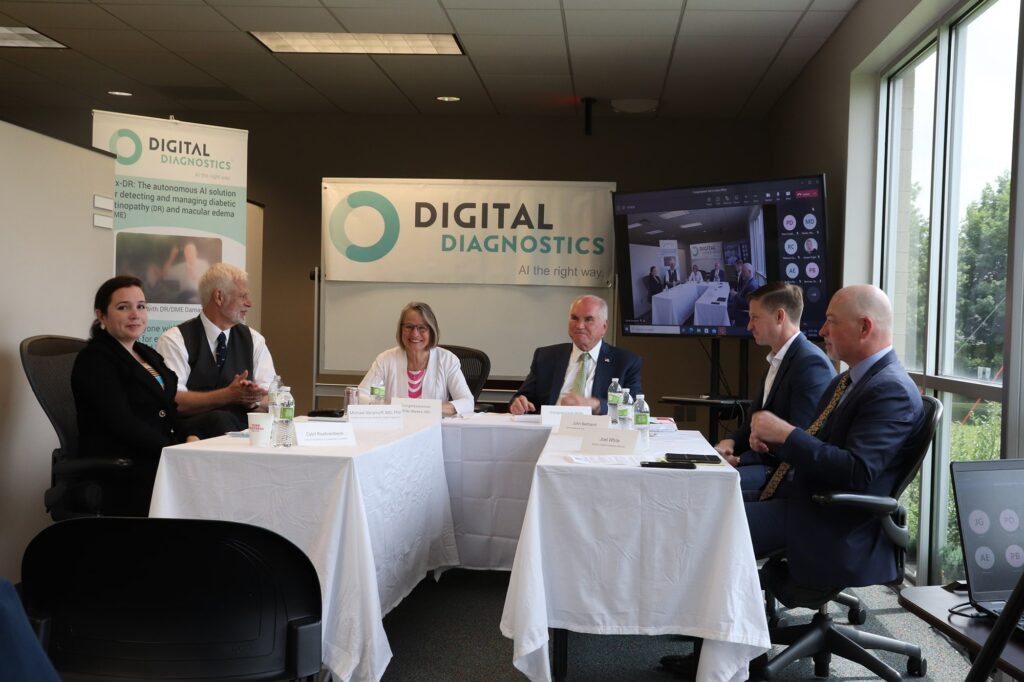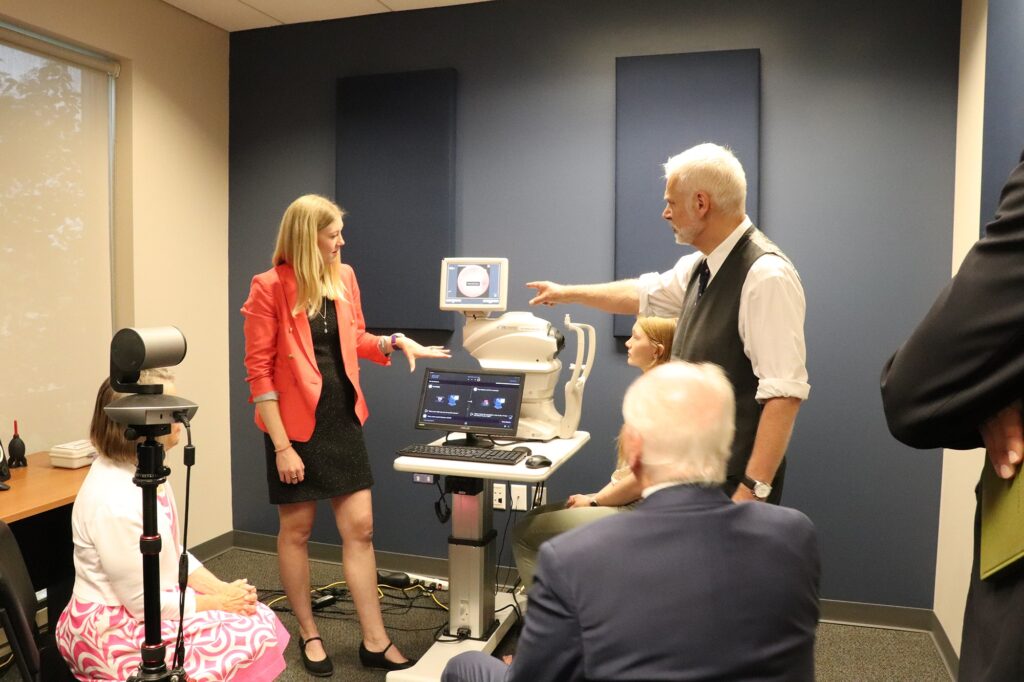Digital Diagnostics hosted the Congressional Healthy Futures Task Force, Modernization Subcommittee for an LumineticsCore™ (formerly known as IDx-DR) demo and roundtable discussion focused on opportunities for using AI to improve health outcomes and save taxpayer dollars.
Digital Diagnostics has worked hard to promote equitable access to high quality healthcare for all, through rigorously validated, ethically designed AI. Most recently, we worked with stakeholders to publish our reimbursement framework for AI. We were also honored to participate in the American Diabetes Association’s annual scientific meeting to showcase how implementing autonomous AI in Federally Qualified Health Centers (FQHC) improves access to care for the most vulnerable and underserved populations.
On June 6, 2022, the Digital Diagnostics leadership was honored to host the leadership of the Congressional Healthy Futures Task Force, Modernization Subcommittee, at our headquarters in Coralville, Iowa. Their Chair, Rep. Dr. Mariannette Miller-Meeks (IA), together with Rep. Mike Kelly (PA) – a member of the House Ways and Means Committee, Health Subcommittee, chose to showcase our work on improving access and quality, while lower expenditures, using the world’s leading autonomous AI technology, and how it resolves health disparities in rural and urban communities.
 Participating in the roundtable discussion was Michael Abramoff, MD, PhD, Founder and Executive Chairman, Digital Diagnostics; Rep. Mariannette Miller-Meeks, MD (IA); Rep Mike Kelly (PA); John Bertrand, Co-Founder and CEO, Digital Diagnostics; Cybil Roehrenbeck, partner at Hogan Lovells and Executive Director of the AI Healthcare Coalition; and Joel White, Executive Director, Health Innovation Alliance.
Participating in the roundtable discussion was Michael Abramoff, MD, PhD, Founder and Executive Chairman, Digital Diagnostics; Rep. Mariannette Miller-Meeks, MD (IA); Rep Mike Kelly (PA); John Bertrand, Co-Founder and CEO, Digital Diagnostics; Cybil Roehrenbeck, partner at Hogan Lovells and Executive Director of the AI Healthcare Coalition; and Joel White, Executive Director, Health Innovation Alliance.
John Bertrand explained “Here at Digital Diagnostics, we are committed to ethically developed AI, and are creating in multiple clinical specialty areas where access to specialty care is difficult, including ophthalmology and dermatology. In doing AI the right way, our focus is on a core goal: harnessing the power of technology to improve outcomes for patients.”
Modernizing the healthcare system means thinking creatively about solutions that lower cost, improve quality of care, and address healthcare inequities. Not all healthcare AI is created equally, and Digital Diagnostics has led the way in thinking about how to design AI in such a way that ethics is at the forefront the development process.
“If done the right way, autonomous AI is already addressing health inequities for underserved and under resourced populations improving patient outcomes, and lower cost,” explained Dr. Abramoff.
 The task force highlighted the first fully autonomous AI to be De Novo authorized by FDA in any specialty of medicine, and the first to be fully reimbursed and covered by Medicare and other payors, as an example of an opportunity to be good stewards of taxpayer dollars and create the needed pathways to facilitate access to preventive care.
The task force highlighted the first fully autonomous AI to be De Novo authorized by FDA in any specialty of medicine, and the first to be fully reimbursed and covered by Medicare and other payors, as an example of an opportunity to be good stewards of taxpayer dollars and create the needed pathways to facilitate access to preventive care.
“With the Medicare Trust Fund set to expire in a few years and a depleted healthcare workforce, we need high value solutions like AI across multiple specialties to provide quality care for patients,” stated Cybil Roehrenbeck.
Digital Diagnostics is honored to be highlighted as an example of healthcare modernization done the right way and is encouraged to see Congress embrace policies that drive access to adoption of technologies that demonstrate a clear benefit for the health outcomes of taxpayers in remote, rural, and urban areas.